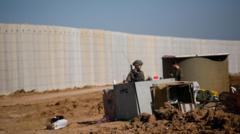The deadline for Israeli forces to withdraw from southern Lebanon has lapsed, but Israeli troops are expected to maintain their presence in certain areas. This decision stems from ongoing issues with Hezbollah, with concerns that the ceasefire agreement, facilitated by the U.S. and France, has yet to be fully implemented.
The ceasefire deal, which aimed to halt 14 months of conflict, included provisions for the withdrawal of Israeli troops and the disarmament of Hezbollah fighters. In conjunction, a deployment of thousands of Lebanese soldiers was planned to strengthen security in areas where Hezbollah had long held sway. However, the situation poses significant challenges for the new Lebanese president, Joseph Aoun, who is dedicated to establishing stability. His administration emphasized ongoing discussions regarding the “dangerous Israeli practices” occurring in the South.
The tension escalated following intensified Israeli military actions, including airstrikes and ground invasions that resulted in substantial civilian casualties in Lebanon and left over a million people displaced. Given this backdrop, the Israeli government stressed that any troop withdrawal would hinge on the effective deployment of the Lebanese army and Hezbollah’s compliance with the line drawn at the Litani River, approximately 30 kilometers from the Blue Line.
As the Lebanese army has reported delays in its deployment due to Israeli procrastination, residents are cautioned against returning to border areas. Israel has indicated a need for additional time to dismantle Hezbollah's infrastructure, without specifying how much longer its forces might remain.
Hezbollah's silence on its potential response signals its precarious situation after sustaining significant losses during the conflict, yet it still retains considerable support among Lebanon's Shia population. Observers interpreted the ceasefire deal as a capitulation for the group, which now faces criticism at home for escalating tensions that have adversely affected Lebanon.
In a broader context, Lebanese parliament recently overcame a two-year deadlock to elect Aoun as president, edging towards reforms to address corruption, economic collapse, and potentially curtailing Hezbollah's military capabilities. Yet, the military's willingness and capability to confront the group remain uncertain, as any steps against Hezbollah could incite domestic violence.
Israel's objectives centered around the return of numerous displaced residents and establishing a buffer against Hezbollah along its border. Meanwhile, Hezbollah has framed its military actions as solidarity with the Palestinians, especially following the recent escalation in the Israeli-Palestinian conflict.
With both sides remaining entrenched in their positions, the region grapples with the potential for renewed hostilities and a quest for enduring peace amidst a fragile truce.
The ceasefire deal, which aimed to halt 14 months of conflict, included provisions for the withdrawal of Israeli troops and the disarmament of Hezbollah fighters. In conjunction, a deployment of thousands of Lebanese soldiers was planned to strengthen security in areas where Hezbollah had long held sway. However, the situation poses significant challenges for the new Lebanese president, Joseph Aoun, who is dedicated to establishing stability. His administration emphasized ongoing discussions regarding the “dangerous Israeli practices” occurring in the South.
The tension escalated following intensified Israeli military actions, including airstrikes and ground invasions that resulted in substantial civilian casualties in Lebanon and left over a million people displaced. Given this backdrop, the Israeli government stressed that any troop withdrawal would hinge on the effective deployment of the Lebanese army and Hezbollah’s compliance with the line drawn at the Litani River, approximately 30 kilometers from the Blue Line.
As the Lebanese army has reported delays in its deployment due to Israeli procrastination, residents are cautioned against returning to border areas. Israel has indicated a need for additional time to dismantle Hezbollah's infrastructure, without specifying how much longer its forces might remain.
Hezbollah's silence on its potential response signals its precarious situation after sustaining significant losses during the conflict, yet it still retains considerable support among Lebanon's Shia population. Observers interpreted the ceasefire deal as a capitulation for the group, which now faces criticism at home for escalating tensions that have adversely affected Lebanon.
In a broader context, Lebanese parliament recently overcame a two-year deadlock to elect Aoun as president, edging towards reforms to address corruption, economic collapse, and potentially curtailing Hezbollah's military capabilities. Yet, the military's willingness and capability to confront the group remain uncertain, as any steps against Hezbollah could incite domestic violence.
Israel's objectives centered around the return of numerous displaced residents and establishing a buffer against Hezbollah along its border. Meanwhile, Hezbollah has framed its military actions as solidarity with the Palestinians, especially following the recent escalation in the Israeli-Palestinian conflict.
With both sides remaining entrenched in their positions, the region grapples with the potential for renewed hostilities and a quest for enduring peace amidst a fragile truce.

















